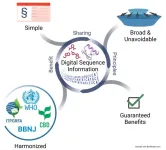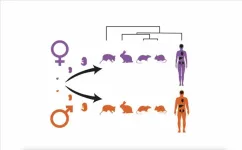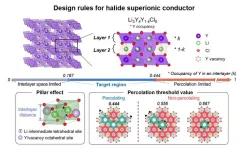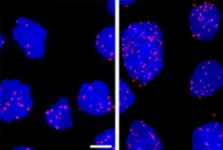(Press-News.org) At the 2022 COP-15 meeting, signatories of the Convention on Biological Diversity reached a new agreement called the Kunming-Montreal Global Biodiversity Framework, which contained provisions to establish a separate, multilateral benefit-sharing mechanism for the use of “digital sequence information” (DSI), that is, the biological data associated with, or derived from, genetic resources such as nucleotide sequences and epigenetic, protein, and metabolite data.
In a new Policy Forum analysis published in the journal Science, researchers underscore that the international community has a narrow window of opportunity to develop a DSI benefit-sharing framework that is simple, harmonized, effective, and transformational. The authors recommend that this new framework break with the past ways countries have regulated access and benefit sharing for biological and genetic materials.
Amber Hartman Scholz, head of the science policy department at the Leibniz Institute DSMZ, German Collection of Microorganisms and Cell Cultures in Braunschweig, Germany; and coauthor of the analysis piece, says that fundamentally the benefit-sharing hypothesis seems broken.
“As we develop a new mechanism for digital sequence data, we should focus on ensuring outcomes, reducing avoidance, and simplifying everything," Scholz says, “As the international policy community builds a new benefit-sharing system for digital sequence information, we have to learn from the past, otherwise, we will fail even more in the digital era."
Michael Halewood, a researcher at the Alliance of Bioversity International and CIAT; and the CGIAR Genebanks Initiative, agrees.
"The practically free, infinitely reproducible, ubiquitous nature of DSI has brought internationally endorsed access and benefit sharing (ABS) systems to a crossroads, and is threatening to run them into the ditch,” he says, “A new harmonized ABS system for DSI should be built on lessons learned from trying to regulate genetic materials; this new system must be coordinated, simple, universally applicable, and unavoidable.”
Time Marches On
For over 30 years, the international community has been forging and reforging international agreements to require users of biological and genetic material sourced from many different countries to share profits or training opportunities and research collaboration with the providers of those materials, for example, if a new drug is developed in one country using samples from an endemic species from another, then the providing country should “benefit” from that development.
“These efforts have been largely unsuccessful, partly because ABS systems developed so far tend to be dragged down by their own bureaucratic weight, designed as they are to micro-regulate each individual act of access and use of each genetic material in the development of new commercial products, and partly because they are pretty easy to avoid, getting genetic materials from unregulated sources,” Halewood says.
On top of that, the emergence of fast, low-cost genome sequencing technologies coupled with open access infrastructures for sharing digital sequence information make it possible to access and use potentially unlimited ranges of genetic sequences without needing to access (or a highly reduced number, at least) of the underlying genetic materials. Furthermore, artificial intelligence applied to biological datasets has exponentially amplified this potential.
The shift in focus to digital sequence information provides an opportunity to develop a better overall system, one that really delivers on the benefit sharing promises of earlier international agreements.
Confronting The Future
The researchers view the COP-15 decision as recognizing that the current transaction-based–benefit-sharing mechanism is not realistic for DSI. They also note the need for a mechanism compatible with open access to biomolecular data from around the world for all biological data and harmonized across multiple UN agreements.
Scholz notes,
“As policymakers take up negotiations in advance of COP16 and begin to set up this new mechanism, they need to look afresh at their historical negotiation positions, reset them, and focus on the outcomes they want for benefit-sharing. The past shows us a way forward that is broader and bolder than 30 years ago.”
Background Information:
CBD COP15 - 15/9. Digital sequence information on genetic resources
KMGBF - Target 13. Fair and equitable sharing of benefits from genetic resources, digital sequence information and associated traditional knowledge
Digital sequence information will influence who benefits from biodiversity
DSI Scientific Network - CBD COP15 Outcome Statement
DSI Scientific Network - Submission of views on issues for further consideration for digital sequence information on genetic resources
About the Alliance of Bioversity International and CIAT
The Alliance of Bioversity International and the International Center for Tropical Agriculture (CIAT) delivers research-based solutions that harness agricultural biodiversity and sustainably transform food systems to improve people’s lives. Alliance solutions address the global crises of malnutrition, climate change, biodiversity loss, and environmental degradation.
With novel partnerships, the Alliance generates evidence and mainstreams innovations to transform food systems and landscapes so that they sustain the planet, drive prosperity, and nourish people in a climate crisis.
The Alliance is part of CGIAR, a global research partnership for a food-secure future. www.alliancebioversityciat.org
About the Leibniz Institute DSMZ
The Leibniz Institute DSMZ-German Collection of Microorganisms and Cell Cultures is the world's most diverse collection of biological resources (bacteria, archaea, protists, yeasts, fungi, bacteriophages, plant viruses, genomic bacterial DNA as well as human and animal cell lines). Microorganisms and cell cultures are collected, investigated and archived at the DSMZ. As an institution of the Leibniz Association, the DSMZ with its extensive scientific services and biological resources has been a global partner for research, science and industry since 1969. The DSMZ was the first registered collection in Europe (Regulation (EU) No. 511/2014) under the Nagoya Protocol and is certified according to the quality standard ISO 9001:2015. As a patent depository, it is the only place in Germany where biological material can be deposited in accordance with the requirements of the Budapest Treaty. In addition to scientific services, DSMZ is also a research institute located on the Science Campus Braunschweig-Süd. DSMZ safeguards more than 85,000 cultures and biomaterials and has around 220 employees. www.dsmz.de
END
Researchers caution that biodiversity benefit-sharing needs a radically new approach
Experts highlight the need to break with the past when developing a new international mechanism to share benefits from the use of digital sequence information (DSI)
2023-11-02
ELSE PRESS RELEASES FROM THIS DATE:
Research outlines how sex differences have evolved
2023-11-02
Francis Crick Institute press release
Under strict embargo: 18:00hrs GMT Thursday 2 November 2023
Peer reviewed
Observational study
People and animals
Researchers at the Francis Crick Institute and Heidelberg University in Germany have shown that sex differences in animals vary dramatically across species, organs and developmental stages, and evolve quickly at the gene level but slowly at the cell type level.
Mammals have different traits depending on sex, like antlers in male deer. These are known as ‘sexually dimorphic’ traits, and include differences which aren’t visible, ...
UCLA researchers develop solid-state thermal transistor for better heat management
2023-11-02
A team of researchers from UCLA has unveiled a first-of-its-kind stable and fully solid-state thermal transistor that uses an electric field to control a semiconductor device’s heat movement.
The group’s study, which will be published in the Nov. 3 issue of Science, details how the device works and its potential applications. With top speed and performance, the transistor could open new frontiers in heat management of computer chips through an atomic-level design and molecular engineering. The advance could also further the understanding of how heat is regulated in the human body.
“The precision control of how heat flows through materials has been a long-held ...
Good news, bad news on dental pain care seen in new study
2023-11-02
Americans who have a tooth pulled or another painful dental procedure in the United States today are far less likely to get opioid painkillers than they were just a few years ago, a new study shows.
That’s good news, since research shows that opioids are not necessary for most dental procedures.
But the COVID-19 pandemic seems to have thrown a wrench into the effort to reduce opioid use in dental care – and not just in the few months after dentists and oral surgeons started providing routine care again after a pause in spring 2020.
The decline in opioid prescriptions filled by dental patients was much faster in the pre-pandemic ...
Researchers identify female sex determining gene in mice
2023-11-02
Francis Crick Institute press release
Under strict embargo: 18:00hrs GMT Thursday 2 November 2023
Peer reviewed
Experimental study
Animals
Researchers at the Francis Crick Institute and the Université Cote d’Azur, together with other labs in France and Switzerland, have identified a gene which is an early determining factor of ovary development in mice.
Typically, mice with XY sex chromosomes develop testes, and mice with XX chromosomes develop ovaries. Whether early gonads become ovaries or testes is due to cells either ...
How organs of male and female mammals differ
2023-11-02
The development of sex-specific characteristics is frequently seen in mammals. These characteristics stem from the activation of corresponding genetic programmes that until now have been largely undescribed by the scientific community. An international research team from the Center for Molecular Biology of Heidelberg University and The Francis Crick Institute in London has, for the first time, decoded the programmes that control the sex-specific development of major organs in selected mammals – humans, mice, rats, rabbits, and opossums. By comparing these programmes, the researchers were also able to trace the ...
New designs for solid-state electrolytes may soon revolutionize the battery industry
2023-11-02
Researchers led by Professor KANG Kisuk of the Center for Nanoparticle Research within the Institute for Basic Science (IBS), have announced a major breakthrough in the field of next-generation solid-state batteries. It is believed that their new findings will enable the creation of batteries based on a novel chloride-based solid electrolyte that exhibits exceptional ionic conductivity.
A pressing concern with current commercial batteries their reliance on liquid electrolytes, which leads to flammability ...
Black holes are messy eaters
2023-11-02
New observations down to light-year scale of the gas flows around a supermassive black hole have successfully detected dense gas inflows and shown that only a small portion (about 3 percent) of the gas flowing towards the black hole is eaten by the black hole. The remainder is ejected and recycled back into the host galaxy.
Not all of the matter which falls towards a black hole is absorbed, some of it is ejected as outflows. But the ratio of the matter that the black hole “eats,” and the amount “dropped” ...
New strategy attacks treatment-resistant lymphomas
2023-11-02
A surprising mechanism that makes some cancers treatment-resistant has been discovered by Weill Cornell Medicine and NewYork-Presbyterian investigators. The mechanism, which involves the shuttling of messenger RNAs (mRNAs) from the nucleus to the cytoplasm, ultimately facilitates DNA repair in cancer cells. These cancer cells can thereby thwart treatments aimed at damaging their DNA.
In a project encompassing both fundamental research and clinical studies they demonstrated that a combination of approved chemotherapies, ...
At least 14% of Americans have had long COVID
2023-11-02
One in seven people in the US reported having had long Covid by the end of 2022, suggests a large-scale investigation of long Covid and symptom prevalence by academics at UCL and Dartmouth.
Having had long Covid is associated with anxiety and low mood, as well as an increased likelihood of continued physical mobility problems and challenges with memory, concentration or understanding, according to the findings published in PLOS ONE.
The risk of anxiety and low mood appeared to be lower for those who have been vaccinated, ...
Mount Sinai researchers receive $7 million to improve outcomes for high-risk blood cancer patients from the Multiple Myeloma Research Foundation
2023-11-02
New York, NY (November 2nd, 2023) — The Mount Sinai Health System has received a $7 million grant from the Multiple Myeloma Research Foundation for a three-year project that aims to fast-track novel translational concepts to improve outcomes for people with high risk myeloma, the second most common blood cancer in the United States.
This grant award will facilitate a multidisciplinary research project that will analyze a large, diverse cohort of patient samples from all over the United States at the genomic and immune level and apply novel functional genomics technology to understand the critical events that drive ...
LAST 30 PRESS RELEASES:
Fecal transplants from older mice significantly improve ovarian function and fertility in younger mice
Delight for diastereomer production: A novel strategy for organic chemistry
Permafrost is key to carbon storage. That makes northern wildfires even more dangerous
Hairdressers could be a secret weapon in tackling climate change, new research finds
Genetic risk for mental illness is far less disorder-specific than clinicians have assumed, massive Swedish study reveals
A therapeutic target that would curb the spread of coronaviruses has been identified
Modern twist on wildfire management methods found also to have a bonus feature that protects water supplies
AI enables defect-aware prediction of metal 3D-printed part quality
Miniscule fossil discovery reveals fresh clues into the evolution of the earliest-known relative of all primates
World Water Day 2026: Applied Microbiology International to hold Gender Equality and Water webinar
The unprecedented transformation in energy: The Third Energy Revolution toward carbon neutrality
Building on the far side: AI analysis suggests sturdier foundation for future lunar bases
Far-field superresolution imaging via k-space superoscillation
10 Years, 70% shift: Wastewater upgrades quietly transform river microbiomes
Why does chronic back pain make everyday sounds feel harsher? Brain imaging study points to a treatable cause
Video messaging effectiveness depends on quality of streaming experience, research shows
Introducing the “bloom” cycle, or why plants are not stupid
The Lancet Oncology: Breast cancer remains the most common cancer among women worldwide, with annual cases expected to reach over 3.5 million by 2050
Improve education and transitional support for autistic people to prevent death by suicide, say experts
GLP-1 drugs like Ozempic could cut risk of major heart complications after heart attack, study finds
Study finds Earth may have twice as many vertebrate species as previously thought
NYU Langone orthopedic surgeons present latest clinical findings and research at AAOS 2026
New journal highlights how artificial intelligence can help solve global environmental crises
Study identifies three diverging global AI pathways shaping the future of technology and governance
Machine learning advances non targeted detection of environmental pollutants
ACP advises all adults 75 or older get a protein subunit RSV vaccine
New study finds earliest evidence of big land predators hunting plant-eaters
Newer groundwater associated with higher risk of Parkinson’s disease
New study identifies growth hormone receptor as possible target to improve lung cancer treatment
Routine helps children adjust to school, but harsh parenting may undo benefits
[Press-News.org] Researchers caution that biodiversity benefit-sharing needs a radically new approachExperts highlight the need to break with the past when developing a new international mechanism to share benefits from the use of digital sequence information (DSI)





